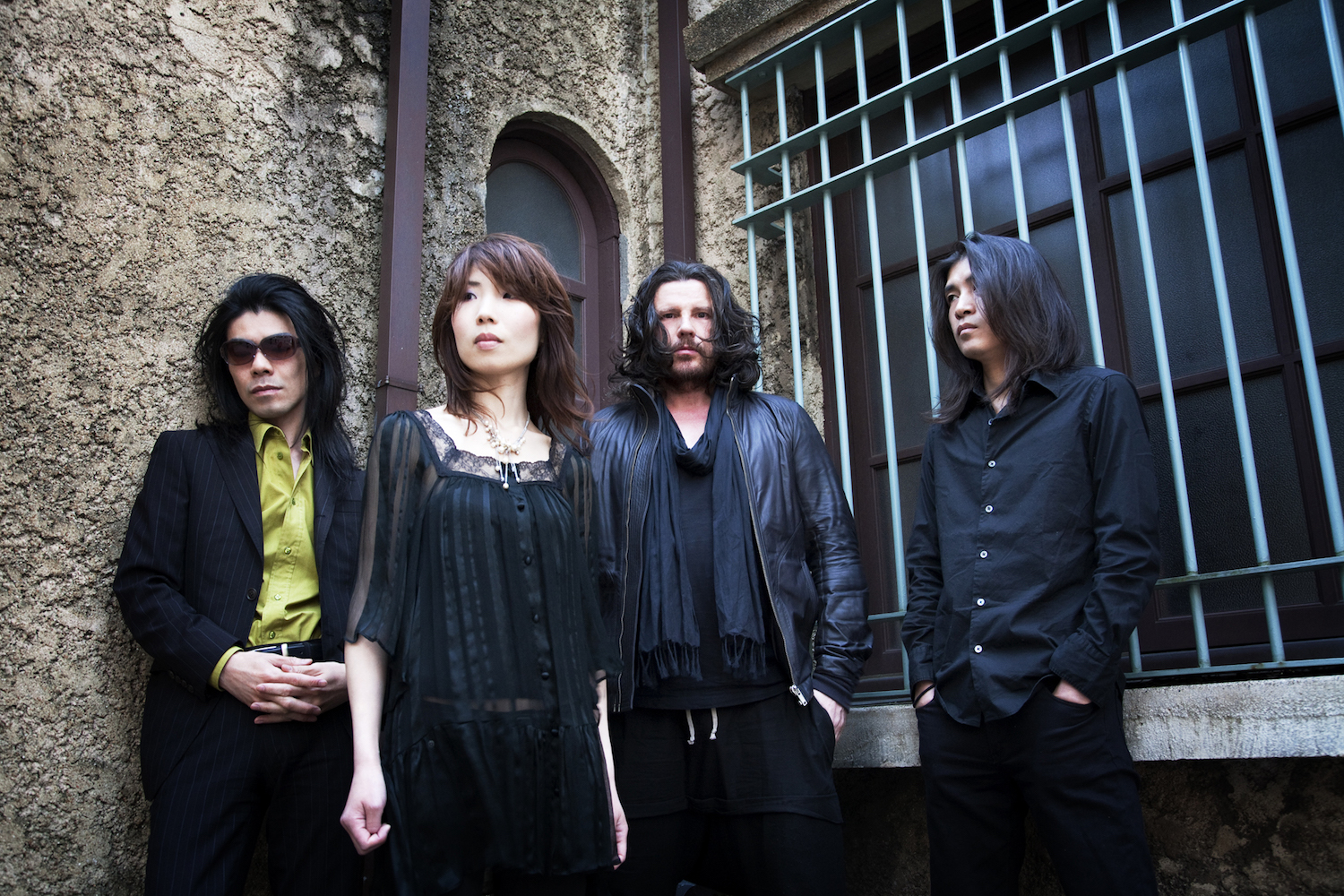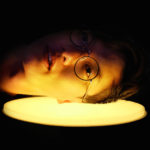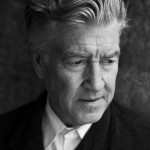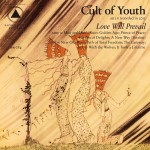Photo MIKI MATSUSHIMSA
Words ANDREW PARKS
“People don’t usually drop the Cult as being one of their favorite ‘cool’ bands,” admits the band’s longtime singer, Ian Astbury, “Because a lot of people associate us with late ’80s histrionics. The reality of the situation is that we were indie kids first–working class musicians who were into post-punk and psychedelic rock. Eventually it evolved into drinking beer, listening to AC/DC and selling millions of records, though, and I just went with it.”
Going with it meant switching gears from the proto-goth tunes of the Southern Death Cult to such pyro-ready stadium-rock singles as “She Sells Sanctuary,” “Wild Flower” and “Fire Woman.” Somewhere between then and now, Astbury launched an ill-fated precursor to Lollapalooza (Gathering of the Tribes), slipped into Jim Morrison’s shoes on three of the Doors’ reunion tours, and tracked an EP with his unlikeliest collaborators yet: the art-damaged Japanese band Boris.
On the eve of Boris and Astbury’s premiere BXI performance at Brooklyn’s Masonic Temple tonight, we asked Astbury about the following: Damien Hirst, Vogue fashion spreads, poverty-stricken reservations, 500-year-old monasteries, and his undying hatred for a certain breed of hipsters. (This story was originally supposed to be about Astbury’s non-musical influences–hence the Hirst question up top–but it quickly turned into an hour-long overview of the singer’s entire career.)

Let’s start by talking about Damien Hirst. I know you’re a major fan, but most people are only familiar with a few works of his–like the aquarium piece where he suspended a shark in formaldehyde. What are some other key facts people should know about him?
Well I’m not a Tea Bag Brit. I’m definitely an ex-patriot with a less romantic view of Britain. That’s one of the things about Damien Hirst, though–he’s a great romantic and working class hero. I love that he deals with death in his work, and the finality and the decay of the human body. It’s not just about trying to be shocking or controversial. His work is about the real themes of life. Like his butterfly paintings. Have you ever seen one of those things close up? They’re amazing. All of a sudden, it’s all about the profoundness of being. It’s an epiphany to look at that work.
Even his skateboard work with Supreme is stunning. It shows that his work isn’t just for the gallery cognoscenti, the enlightened Illuminati of Those Who Understand Culture.
Do you feel like the deeper meaning of his work is lost on most people–people who see it as just a shark in a tank or whatever?
Precisely. Some people don’t have that lexicon. On some level, they’re experiencing [the work], but their rational machinery doesn’t allow them to enjoy it. It just makes them think, ‘I shouldn’t like this. This is pretentious. It doesn’t touch me.’ Fine art’s a tough one. I remember the first time I saw [Jackson] Pollack. I didn’t know what it was, but it brought me to tears.
Really?
Yeah, I just started crying. It brought some raw emotion out in me. The same thing happened when I saw [Picasso’s] Guernica painting close up and anything by Mark Rothko. There’s a guy who cut his wrists to the bone. When you hear that, his paintings suddenly make sense. All of these artists are trying to show how disconnected we’ve become from our emotions. That’s the kind of textural emotional space that’s in Boris and Sunn, too.
I’ve seen some fantastic snow jobs over the years–guys who look like they should be the next Bob Dylan or whatever, but once you examine the work, you think, ‘Where did all of that [emotion] go?’
“Ever since I’ve been a kid, I’ve felt like burning things down when life gets too comfortable”
You don’t sound like much of a skeptic.
No, I’m not. I give everything a chance. I guess it’s because I was such a fan growing up. Like I’d go to school and wouldn’t be afraid to say I liked Slade. They were kinda laughed at, but songs like “How Does It Feel?” have this great melancholic quality to them. They sound very sincere about what they did. They weren’t educated in the higher schools of learning, and maybe weren’t as eloquent as other artists, but there’s a sentimentality to their music that hits a spot in me.
I’m always skeptical about the kids who always pick the same things. Like I love the Smiths, but when journalists started jumping on them, it was for all of the wrong reasons. Like their intellectuality. They’re intellectual bullies who can beat up a guy who’s less intuitive. If you ask me, everyone’s opinion is valid. Ab-so-fucking-lutely. We’re all in the same space trying to work it all out. It’s like John Lennon said, “Your life is what happens when you’re busy making other plans.”
The culture of celebrity that we have right now is very trite and shallow, but we have a choice. We don’t have to watch any of it. If you don’t like Lady Gaga, you don’t have to listen to Lady Gaga. It’s okay. There’s other things.
You’ve moved around a lot over the course of your career. Where are you based at the moment?
I’m in the Beachwood Canyon part of California. I came here for the desert, the ocean, and the mountains. One of my closest friends, [producer/multi-instrumentalist] Chris Goss, is based in [Joshua Tree], so I’m planning on doing a lot of work there.
I spent three years in Manhattan, and before that I was in Vancouver and India. The perception of Los Angeles is that it’s this superficial, disposable place, but the reality of it is that it’s a sprawling metropolis and if you go past West Hollywood, all of a sudden you’re in very poor neighborhoods. It’s real life. I mean, the majority of people here are Hispanic. And they’re very humble. That’ll set you straight very quickly.
Ever since I’ve been a kid, I’ve felt like burning things down when life gets too comfortable.
You recorded the BXI EP in Japan. Did you decide to go there because it’d be more of a natural environment for Boris?
There was a discussion of bringing them here, but it didn’t make sense for them to bring their whole operation to New York when I was heading there anyway. I’m very grateful we got to work on it in Tokyo. It has a certain mystique and otherworldly-ness to it.
It’s a different kind of energy too, isn’t it?
It is. New York’s a bit crazier, but Tokyo has an ordered chaos to it.
You know what’s funny? When you ask New Yorkers–like hipsters from Brooklyn–about L.A. They’ll say how much L.A. sucks, and yet, they remind me of why I left L.A. the first time.
What do you mean? That stereotype of how superficial it is?
Absolutely. You can always find a kid on a fixed gear bike with a mustache, a little white v-neck T-shirt, some keys hooked onto their jeans, and a beanie. I always go, “There’s that guy again! The twentieth one I’ve seen today.”
Were you living in that part of Brooklyn before you moved back to California?
No, I was living in the West Village.
You realize that’s a big part of Boris’ audience in New York though, right? The Brooklyn kids…
Yeah, but some of them go for the wrong reasons. For example, I went to see the [black-metal documentary] Until the Light Takes Us and there was a load of hipsters who clearly just came off the L train, looking like they just walked out of Urban Outfitters. I’m not one to judge other people’s fashion, but this gang of 12 kids laughed throughout the whole film. Which I thought was pretty sad. That movie affected me deeply.
That part with the Satryicon guy cutting himself was pretty intense.
Exactly. You have to get what they’re saying–that they’re not a part of McDonald’s, MTV or Lady Gaga; that they’re an extension of nature, with a pagan culture that worships the trees, the sun, and the mountains. The poet Robert Bly said it best when he said that our problems began when we lost touch with wild animals. When I hear a statement like that–by an older guy in his eighties now–it breaks my fucking heart.
Is that one of the main reasons you moved back to California? To feel more in touch with nature and your surroundings?
To be honest with you, the city was doing my head in. I was a refugee, though. I had nowhere else to go. I mean, it was great at times. Like when I walked out of my house and Sam Shepard was standing outside. Another day I bumped into Patti Smith in the street. That’s fantastic.
Why did you feel like a refugee? Because you never felt at home here?
I never felt at home anywhere. I’ve been moving since I was literally 6 years old. When I meet British people and they ask me what part of England I’m from, I always say, “You don’t need to know. It’s not important. I don’t identify with you.”
Where have you felt the closest to having a real home then?
New York. I could have stayed there longer, but I knew I had to disappear into the mountains and the Pacific Northwest. I love it out there. It’s like the Himalayas, probably my favorite place in the world. Walking through there with the Tibetans and Sherpas is just fucking amazing. It’s like Star Wars. When you’re in a 500-year-old monastery and they’re doing morning prayers–those guttural throat chants–when you hear that shit and smell the Tibetan candles, you think, ‘This is what life should be about.’
Life should have a level of peace, you mean?
Yeah, serenity–being in an intuitive space. When you’re in the city, you’re distracted by so many things, from people to traffic. There’s too much stimulation. And we don’t really know how we feel until we sit down with a therapist or something.
It sounds like you’re the kind of person who’s still interested in different ideas of spirituality but you don’t subscribe to any one of them…
That’s fair to say. Some people would call me a pseudo-spiritualist.
Well people have always said that you’re interested by Native American culture, which is one of the reasons you became a replacement for Jim Morrison in the Doors.
People make that comparison, but when I ask them what they actually know about Native American culture, it’s very limited. That criticism’s been thrown at me, but I was living around Native Americans when I was 11 years old and living in Canada. I didn’t even know who Jim Morrison was back then…
It must be sobering to see reservations first hand…
Right. Go ask your hipster friends if they’ve ever lived in the Rapid City area of South Dakota. The reservations are some of the poorest areas in the United States–human beings living in squalor. I’ve actually been working on a documentary down there. It’s such a precious culture. The Americas are a magnificent continent. It’s phenomenal what’s here in nature once you get out of the cities. I mean, why the fuck would you want to sit in a nightclub, shoveling cocaine up your nose in a nightclub and ordering Cristal? I’ve certainly had my fair share of narcissistic, hedonistic behavior, but I’ve balanced it off by losing it all and asking the questions, finding the elders, and looking to our teachers.
I’m writing something called Death of a Hipster right now and it’s semi-autobiographical, I think. The [BXI] song “Magickal Child” is about a Korean model named Daul Kim. She killed herself in Paris two years ago. She was incredibly beautiful but she was also a great poet and amazing writer. So I was really fascinated with this beautiful person who’s objectified as one thing but they feel themselves to be something else–something much more delicate. She was only 20 years old when she died. It’s fucking crazy…
Suicide has always been an issue in the fashion industry but some people have written about that becoming a bigger problem lately.
There’s this famous picture of Daul Kim where she’s wearing a leopard skin coat and she’s holding these two machine guns. She’s looking at the camera sheepishly but there’s something incredibly striking about it. She looks like some sort of exotic terrorist or something–a Baader Meinhof for the 21st century–but there’s also this little wounded 20-year-old girl in there. So I wrote, “Your wounded guns point back at me.” It’s as if those guns were her only line of defense.
If we’re really honest with ourselves, are we really buying into the Pitchfork Media culture? The intellectual bully culture? I mean, I experienced that as a kid. I was on a TV show with Thurston Moore and Kim Gordon, had just bought Daydream Nation, and loved Sonic Youth. When they finished their interview, I said, “Nice to meet you. I’m a really big fan.” And they walked off. When I went into the interview, the guy looked at me and said, “Oh, well they just reviewed your video. They said, ‘What was that?'” And that really fucking hurt. It was the same kind of cold, intellectual bullying when I moved to New York and saw them at parties, too.
I don’t know what it was, although my friend said, “Have you looked at yourself lately? Well, you don’t look like them.”
You look like a rock star instead?
Maybe. I mean, I was in Vogue magazine when I was 23 years old, but I don’t know what that has to do with it. I guess I had a skinny little ass when “Fire Woman” came out, when I used to drink like a fish and fight like a maniac.
Hasn’t that always been the tough thing about your career? That you’ve never been alternative enough for the underground or straightforward enough for the mainstream?
Oh, I get the irony of it all. I get how the Cult may have come off as incredibly crass sometimes. There’s moments where it’s incredibly ironic.
While that may be true, you seem like the type of person who pursues a project because he really believes in it, whether it’s Boris, the Doors, or singing on a song for UNKLE.
Yeah, James [Lavelle] is a very private person as well. He doesn’t just invite anybody in the door. He’s like Stanley Kubrick–fucking precise about every fucking detail. He knows exactly what he wants. In fact, when I was singing “Burn My Shadow,” he said, “No vibratto. I want it like you’re talking. Just give me Ian. I don’t want the rock singer. I want the guy.”
How did you and Boris hit it off then?
There was a lot of talking with Stephen [O’Malley] and Greg [Anderson, of Sunn O)))] at first. You’ve got to go through a lot of layers to reach the inner sanctum of Boris. I approached their agent first–about five years ago. So they kinda knew about my love of the band already, and when I met Greg and Stephen at a Sunn show last year, they kind of brokered the deal. I think Boris approached me first about the project, which shocked me.
Was the music already done when they approached you?
Pretty much, aside from some overdubs. They sent me 10 pieces, so I picked four and lived with them for a while.
Was their cover of “Rain” recorded yet?
That came together later. They were adamant about covering it, which surprised me. I was like, “That’s a pop song written by a 23-year-old.” But they said they really liked the song. And when I heard their version, I was blown away by it. I love the way [Wata] sings it, and was very honored that they wanted to do it.
You seem humble now, but the Cult was touring with some major bands back in the day.
I didn’t know what day it was for a while, because we were touring so much–playing shows with Guns N’ Roses, Billie Idol, and Metallica was a totally different animal.
Guns N’ Roses opened for you, right?
Yeah, at my insistence. And then there was the whole Gathering of the Tribes festival, which was my idea and Bill Graham helped put on.
You lost a lot of your own money on that, didn’t you?
About $50,000, yeah. My business is being creative; I’m a terrible businessman beyond that. It was an altruistic venture–a Monterey Pop Festival for this generation. Hip-hop wasn’t even on the map in 1990, and I wanted to see Guns N’ Roses play on the same stage as N.W.A. The festival was 10 dollars…
Ten dollars?
Yep. Fourteen acts for 10 dollars–Public Enemy, Iggy Pop, Soundgarden, Ice-T, the Cramps, etc. etc. Mark Geiger, an agent for Jane’s Addition and Stone Roses, was advising people not to do the event because they weren’t involved. Anyway, he went on to start Lollapalooza with Ted Gardener and Perry Farrel, strangely enough. Which was kinda confusing, like, ‘Did I start this?’ It’s like when you host a party and get kicked out of your house.
I’ve been knocked down so many times, though. I’ve been laughed at, ridiculed, pissed on, stabbed–all of it. But I love music. I love culture. I was at the Die Antwoord concert the other night actually…The second I saw their video, I thought, ‘This is brilliant–every last bit of it.’ It’s like America through a filter thrown back at America–really fucking fresh. But as the story often goes, they got signed to Interscope and brought to L.A. for their ‘big show’ and it was kinda a flop. I thought a litany of insider-y L.A. folks would be there, but only me and Andy Samberg showed up. That was it. And I’m not exactly part of the Who’s Who right now, so it was basically just him, some goth girls, and guys in Affliction T-shirts.
Meanwhile, the record execs upstairs are all like, [In a mocking American accent] “This is really great. Hey, this is really hip.”
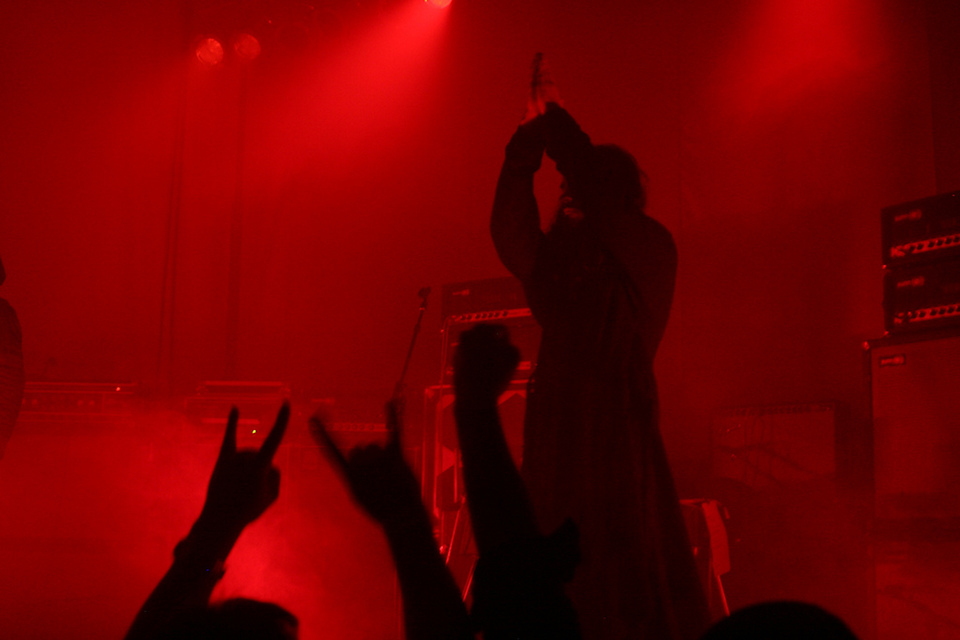
That’s pretty ridiculous. Speaking of shows, I’d love to hear about the first time you saw Sunn play.
The first time I saw them was about a year ago. I remember a lot of young men standing around reverentially, waiting for them to play. And I met Stephen before the show and was just gushing, like, “I love you guys.” The atmosphere inside was great because it was an old Masonic building and just looking at the amplifiers–the entire stage aesthetic–made it appear like a ritual was about to occur. Not a performance–a ritual. And once they came onstage, everything else melted away. It felt transporting, otherworldly, and profoundly empowering.
I got Black One in 2005 and I remember driving around downtown L.A. in a Mustang Cobra with tinted windows and that record on. It just fit perfectly. The way the car was vibrating and it was working with everything around me felt like a religious experience.
Not quite the record you’d expect someone to blast while speeding through L.A.
I highly recommend it.
